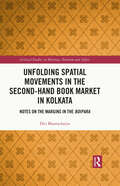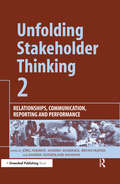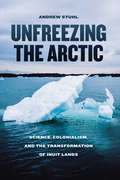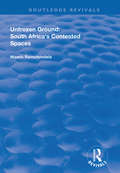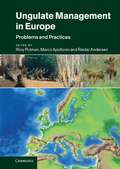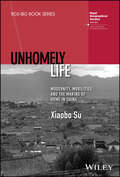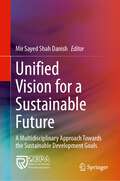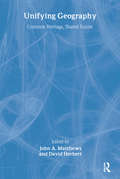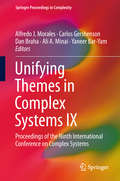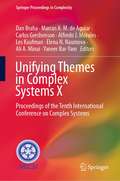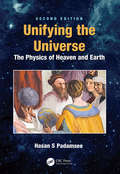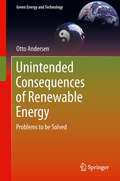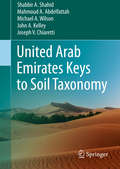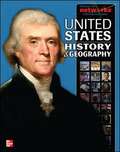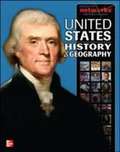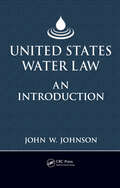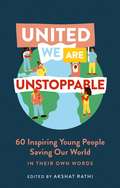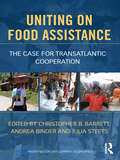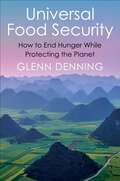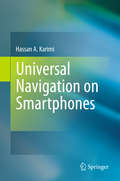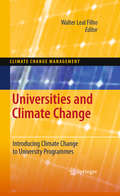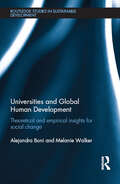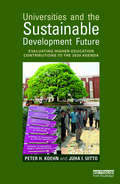- Table View
- List View
Unfolding Spatial Movements in the Second-Hand Book Market in Kolkata: Notes on the Margins in the Boipara (Critical Studies in Heritage, Emotion and Affect)
by Diti BhattacharyaThis insightful book unfolds the boipara, exploring the acts of thinking and writing about space and place in the context of recent key conversations at the intersections of cultural geographies, mobilities, materialities and heritage studies. This book reconsiders how we can think about space, place and spatialisation using the book market as a case study. Focusing on everyday lived and imagined experiences within the space, it provides insights into the intricacies, complexities and mobilities involved in the many ways in which temporal, material, structural and sensorial experiences of spaces are inter-implicated. As expression and method, this work aims to be a writing of space (rather than a writing about space) produced through the interleafing of the author’s lived spatial experience of the boipara with the stories, experiences and memories of other regulars who have used and continue to use it, along with the non-human materialities and mobilities that characterise it. This book is essential reading for a wide international audience, particularly those interested in the evolving discussions on mobility, or writing about space and place, materiality, assemblage theory and heritage spaces in the South Asian context.
Unfolding Stakeholder Thinking 2: Relationships, Communication, Reporting and Performance
by Sandra Waddock Jörg Andriof Bryan Husted Sandra Sutherland RahmanThis book is the companion to "Unfolding Stakeholder Thinking: Theory, Responsibility and Engagement", which examined many emerging theoretical and normative issues and was released to acclaim in October 2002. "Unfolding Stakeholder Thinking 2" collects a series of essays by leading researchers worldwide to focus on the practice of stakeholder engagement in terms of relationship management, communication, reporting and performance. As stakeholder relationships and business in society have become increasingly central to the unfolding of stakeholder thinking, important new topics have begun to take centre stage in both the worlds of practice and academia. The first part of the book makes clear that simply engaging with stakeholders is insufficient to build successful stakeholder strategies. Companies, considered as the focal entity in a relationship, also need to actively communicate with stakeholders and manage their relationships. Dialogue is essential but can only be useful if companies listen to the messages that stakeholders are sending them. It is also essential to understand the role of power and influence in stakeholder engagement strategies especially if partnerships or collaborations emerge from the relationships that are engendered. The book examines a wide range of corporate–NGO collaborations to determine what makes them effective – and what makes them fail. Conflict management in stakeholder alliances is also discussed. The second part of the book addresses the critically important element of emerging schemes for the assessment, measurement and reporting of business in society and relationships involving stakeholders. A variety of current approaches to stakeholder assessment and reporting are discussed here including social auditing and sustainability reporting. The evolution of stakeholder thinking has led to a new view of the firm as an organism embedded in a complex web of relationships with other organisms. The role of management becomes immensely more challenging, when stakeholders are no longer seen as simply the objects of managerial action but rather as subjects with their own objectives and purposes. This book captures the complexity of managing relationships with stakeholders and will provide both practitioners and researchers with a wealth of information on the benefits and consequences of this practice.
Unfreezing the Arctic: Science, Colonialism, and the Transformation of Inuit Lands
by Andrew StuhlIn recent years, journalists and environmentalists have pointed urgently to the melting Arctic as a leading indicator of the growing effects of climate change. While climate change has unleashed profound transformations in the region, most commentators distort these changes by calling them unprecedented. In reality, the landscapes of the North American Arctic--as well as relations among scientists, Inuit, and federal governments-- are products of the region's colonial past. And even as policy analysts, activists, and scholars alike clamor about the future of our world's northern rim, too few truly understand its history. In Unfreezing the Arctic, Andrew Stuhl brings a fresh perspective to this defining challenge of our time. With a compelling narrative voice, Stuhl weaves together a wealth of distinct episodes into a transnational history of the North American Arctic, proving that a richer understanding of its social and environmental transformation can come only from studying the region's past. Drawing on historical records and extensive ethnographic fieldwork, as well as time spent living in the Northwest Territories, he closely examines the long-running interplay of scientific exploration, colonial control, the testimony and experiences of Inuit residents, and multinational investments in natural resources. A rich and timely portrait, Unfreezing the Arctic offers a comprehensive look at scientific activity across the long twentieth century. It will be welcomed by anyone interested in political, economic, environmental, and social histories of transboundary regions the world over. The author intends to donate all royalties from this book to the Alaska Youth for Environmental Action (AYEA) and East Three School's On the Land Program.
Unfrozen Ground: South Africa's Contested Spaces (Routledge Revivals)
by Maano RamutsindelaThis title was first published in 2001. Examining state-driven programmes of land reform, this book provides an important examination of the transformation process in post-apartheid South Africa at both national and local levels. It captures the dynamics of socio-political change at national and local levels and provides an important analysis of integration in one of the world’s most divided societies.
Ungulate Management in Europe
by Marco Apollonio Rory Putman Reidar AndersenThis book considers a number of problems posed by ungulates and their management in Europe. Through a synthesis of the underlying biology and a comparison of the management techniques adopted in different countries, the book explores which management approaches seem effective - and in which circumstances. Experts in a number of different areas of applied wildlife biology review various management problems and alternative solutions, including the impact of large ungulates on agriculture, forestry and conservation habitats, the impact of disease and predation on ungulate populations and the involvement of ungulates in road traffic accidents and possible measures for mitigation. This book is directed at practising wildlife managers, those involved in research to improve methods of wildlife management, and policy-makers in local, regional and national administrations.
Unhomely Life: Modernity, Mobilities and the Making of Home in China (RGS-IBG Book Series)
by Xiaobo SuHow do Chinas mobile individuals create a sense of home in a rapidly changing world? Unhomely life, different from houselessness, refers to a fluctuating condition between losing home feelings and the search for home — a prevalent condition in post-Mao China. The faster that Chinese society modernizes, the less individuals feel at home, and the more they yearn for a sense of home. This is the central paradox that Xiaobo Su explores: how mobile individuals—lifestyle migrants and retreat tourists from China's big cities, displaced natives and rural migrants in peripheral China—handle the loss of home and try to experience a homely way of life. In Unhomely Life, Xiaobo Su examines the subjective experiences of mobile individuals to better understand why they experience the loss of home feelings and how they search for home. Integrating extensive empirical data and a robust theoretical framework, the author presents a journey-based critical analysis of “home” under constant making, un-making, and re-making in post-Mao China. Su argues that the making of home is not a solely economic or rational calculation for maximum return, but rather a synthesis of resistance and compromise under the disappointing conditions of modernity. Offering rich insights into the continuity and disruption of China's great transformation, Unhomely Life: Develops an original theory of unhomely life that incorporates contemporary research and traditional Chinese ideas of home Explores the process of homemaking and its implications for understanding the costs of high-speed economic growth in China Analyzes mobile individuals across different genders, ages, ethnicities, social classes, and economic backgrounds to address the balance between meaning and money in everyday life Containing in-depth and sophisticated empirical data collected from 2002 to 2020, Unhomely Life: Modernity, Mobilities, and the Making of Home in China is an invaluable resource for advanced undergraduates, graduate students, lecturers, and academic researchers in cultural studies, migration, tourism, China studies, cultural anthropology, sociology, and social and cultural geography.
Unified Vision for a Sustainable Future: A Multidisciplinary Approach Towards the Sustainable Development Goals
by Mir Sayed Shah DanishUnified Vision for a Sustainable Future: A Multidisciplinary Approach Towards the Sustainable Development Goals focuses on energy and the environment, highlighting interdisciplinary research, innovative strategies, and global initiatives presented at the International Conference on Collaborative Endeavors for Global Sustainability (CEGS 2024). The book explores the various pillars of sustainability – environmental, social, institutional, technical, and economic – and provides readers with case studies, practical solutions, and models for the UN’s Sustainable Development Goals. The book further examines the implications of these initiatives, analyzing their potential for long-lasting, sustainable impact.This book will appeal to a broad readership. Academics, researchers, policymakers, sustainability advocates, and anyone interested in global sustainability will find the book insightful.
Unifying Geography: Common Heritage, Shared Future
by John A. Matthews David T. HerbertIt can be argued that the differences in content and approach between physical and human geography, and also within its sub-disciplines, are often overemphasised. The result is that geography is often seen as a diverse and dynamic subject, but also as a disorganised and fragmenting one, without a focus.Unifying Geography focuses on the plural and competing versions of unity that characterise the discipline, which give it cohesion and differentiate it from related fields of knowledge. Each of the chapters is co-authored by both a leading physical and a human geographer. Themes identified include those of the traditional core as well as new and developing topics that are based on subject matter, concepts, methodology, theory, techniques and applications.Through its identification of unifying themes, the book will provide students with a meaningful framework through which to understand the nature of the geographical discipline. Unifying Geography will give the discipline renewed strength and direction, thus improving its status both within and outside geography.
Unifying Themes in Complex Systems IX: Proceedings of the Ninth International Conference on Complex Systems (Springer Proceedings in Complexity)
by Yaneer Bar-Yam Ali A. Minai Alfredo J. Morales Carlos Gershenson Dan BrahaUnifying Themes in Complex Systems is a well-established series of carefully edited conference proceedings that serve to document and archive the progress made regarding cross-fertilization in this field. The International Conference on Complex Systems (ICCS) creates a unique atmosphere for scientists from all fields, engineers, physicians, executives, and a host of other professionals, allowing them to explore common themes and applications of complex systems science. With this new volume, Unifying Themes in Complex Systems continues to establish common ground between the wide-ranging domains of complex systems science.
Unifying Themes in Complex Systems X: Proceedings of the Tenth International Conference on Complex Systems (Springer Proceedings in Complexity)
by Les Kaufman Yaneer Bar-Yam Ali A. Minai Alfredo J. Morales Carlos Gershenson Dan Braha Marcus A. M. de Aguiar Elena N. NaumovaThe International Conference on Complex Systems (ICCS) offers a unique interdisciplinary venue for researchers from the physical and biological sciences, social sciences, psychology and cognitive science, engineering, medicine, human systems, and global systems. This proceedings volume gathers selected papers from the conference. The New England Complex Systems Institute (NECSI) has been instrumental in the development of complex systems science and its applications. NECSI pursues research, education, knowledge dissemination, and community development efforts around the world to promote the study of complex systems and its application for the benefit of society. NECSI hosts the International Conference on Complex Systems and publishes the NECSI Book.
Unifying the Universe: The Physics of Heaven and Earth
by Hasan PadamseeUnifying the Universe: The Physics of Heaven and Earth presents a non-technical approach to physics for the lay-science enthusiast. This popular textbook, which evolved from a conceptual course at Cornell University, is intended for non-science undergraduate students taking their first physics module. This second edition maintains its unique approach in crossing boundaries between physics and humanities, with connections to art, poetry, history, and philosophy. It explores how the process of scientific thought is inextricably linked with cultural, creative, and aesthetic aspects of human endeavor, opening the readers up to new ways of looking at the world. The text has been fully updated throughout to address current and exciting new topics in the field, such as exo-planets, the accelerating Universe, dark matter, dark energy, gravitational waves, super-symmetry, string theory, big bang cosmology, and the Higgs boson. There is also an entirely new chapter on the Quantum World, which connects the fascinating topics of quantum entanglement and quantum computing. Key Features: Provides a solid, yet accessible, background to basic physics without complex mathematics Uses a human interest approach to show how science is significant for more than its technological consequences Discusses the arts and philosophies of historical periods that are pertinent to the subject.
Unintended Consequences of Renewable Energy
by Otto AndersenEnergy technologies in the future will need to be based on renewable sources of energy and will, ultimately, need to be sustainable. This book provides insight into unintended, negative impacts and how they can be avoided. In order to steer away from the pitfalls and unintended effects, it is essential that the necessary knowledge is available to the developers and decision makers engaged in renewable energy. The value of this book lies in its presentation of the unintended health and environmental impacts from renewable energies. The book presents results from cross-disciplinary research on the implementation of alternative fuels in the transport sector, namely hydrogen, electricity and biodiesel. This is followed by an assessment of environmental impacts from the production of solar cells. Critical reviews on the use of nanotechnology and nanomaterials in the energy technologies is then provided, with the formation of nanoparticles during combustion of bio-blended diesel and their toxic effects, discussed in detail.
United Arab Emirates Keys to Soil Taxonomy
by Shabbir A. Shahid Mahmoud A. Abdelfattah Michael A. Wilson John A. Kelley Joseph V. ChiarettiCentral to human life and civilization, soils are an integral part of the physical and cultural environment. Although we may take them for granted, the rise and fall of civilizations is closely linked with the use and abuse of soil and water resources. It is therefore important to evaluate soils for their quality and link them to appropriate uses and services. This book provides information on soil classification and shows how to key out taxa relevant to UAE soils. The latest soil inventory of United Arab Emirates reveals that a rather uniform looking desert landscape has, in fact, a diversity of subsurface features. These features confirm the soil diversity in terms of classification, chemistry, physics, mineralogy, fertility, suitability for different uses and vulnerability to land degradation. United Arab Emirates Keys to Soil Taxonomy presents information for keying out the soils of the United Arab Emirates into separate classes and provides a guide to associated laboratory methods. The classification used predominantly is extracted from the 11th edition of the USDA-NRCS Keys to Soil Taxonomy, and sections relevant to the soils found in the UAE are included here. Primarily, this key is designed to fit the soil system of the United Arab Emirates. Information not found in the USDA key has been added, including criteria and classes for: 1) differentiating anhydritic soils from gypsic soils, 2) identifying "lithic" subgroups for Aquisalids and Haplosalids, 3) identifying "salidic" subgroups within the great groups of Gypsids, Calcids, Psamments, and Orthents, and 4) incorporation of phases for soil taxa. A subsurface diagnostic horizon and mineralogy class (anhydritic), not reported earlier in the world soil literature and, recently found in the UAE, has also been added to the book. The book also offers a mechanism for updating the current soil surveys, and will facilitate the correlation of soils from new surveys in the UAE. Additionally, it will help the international soil science community to converse about UAE soils, and facilitate comparison to soils of other regions. These linkages allow countries with similar mapping and classification procedures and similar soils to transfer agriculture technology without conducting long-term experiments under similar environmental conditions, especially for Gulf Cooperation Council countries (Bahrain, Kuwait, Qatar, Oman, and Saudi Arabia).
United States History & Geography [Grade 10]
by Joyce Appleby Alan Brinkley Albert S. BroussardTrusted, renowned authorship relates the history of the United States in a streamlined print Student Edition built around Essential Questions using Understanding by Design® instructional approach.
United States History and Geography
by Mcgraw HillStudents explore the history of our nation in a whole new way with the first fully integrated print and digital curriculum for today's technology-ready students. Networks combines print resources grounded in solid pedagogy with a full suite of teaching and learning tools for a flexible, customized learning experience. Visit McGraw-Hill Networks for more information!
United States History and Geography (United States History Series)
by Joyce Appleby Alan Brinkley Donald A. Ritchie Albert S. Broussard James M. McPhersonTrusted, renowned authorship relates the history of the United States in a streamlined print Student Edition built around Essential Questions using Understanding by Design® instructional approach.
United States Water Law: An Introduction
by John W. JohnsonA Vital Explanation of Water Law and PolicyBecause demand for and access to quality water far exceeds the current supply, it is increasingly critical to understand the state and federal laws and policies that govern water rights. From farming, fishing, and biology to manufacturing, mine operation, and public water supply, water regulation affects a
United We Are Unstoppable: 60 Inspiring Young People Saving Our World
by Akshat RathiFrom Asia to Africa, Oceania to Europe, the Americas and Antarctica, see the world through the eyes of 60 young people who are fighting for their homes and their futures in the face of climate change.The stories in this book are devastating, defiant, inspiring and moving - but, above all, they are full of hope. The climate crisis can feel overwhelming but, as this book shows, for every problem there are young voices raising awareness, creating solutions and demanding that things change. It's not too late to save the world. United we really are unstoppable. Aditya Mukarji (16) stopped 26 million straws from polluting the oceans. Cecilia La Rose (15) filed a lawsuit against the Canadian federal government for contributing to global warming. Delphin Kaze (19) founded a company that produces eco-charcoal from organic waste in Burundi.And more inspiring stories from . . . Htet Myet Min Tun; Tatyana Sin; Iman Dorri; Howey Ou; Theresa Rose Sebastian; Nasreen Sayed; Liyana Yamin; Albrecht Arthur N. Arevalo; Akari Tomita; Karel Lisbeth Miranda Mendoza; Emma-Jane Burian; Anya Sastry; Ricardo Andres Pineda Guzman; Cricket Guest; Lia Harel; Shannon Lisa; Khadija Usher; Brandon Nguyen; Vivianne Roc; Octavia Shay Muñoz-Barton; Payton Mitchell; Ashley Torres; Eyal Weintraub; Daniela Torres Perez; Catarina Lorenzo; Juan José Martín-Bravo; João Henrique Alves Cerqueira; Gilberto Cyril Morishaw; Holly Gillibrand; Stamatis Psaroudakis; Lilith Electra Platt; Anna Taylor; Raina Ivanova; Federica Gasbarro; Laura Lock; Agim Mazreku; Adrian Toth; Kaluki Paul Mutuku; Nche Tala; Sebenele Rodney Carval; Jeremy Raguain; Lesein Mathenge Mutunkei; Toiwiya Hassane; Koku Klutse; Tsiry Nantenaina Randrianavelo; Ruby Sampson; Tafadzwa Chando; Elizabeth Wanjiru Wathuti; Ndèye Marie Aida Ndieguene; Zoe Buckley Lennox; Lourdes Faith Auhura Parehuia; Alexander Whitebrook; Komal Narayan; Kailash Cook; Madeleine Keitilani Elceste Lavemai; Freya May Mimosa Brown; and Carlon Zackhras25p from the sale of physical copies of the book will go to a charity advocating for the protection of children's rights.
United We Are Unstoppable: 60 Inspiring Young People Saving Our World
by Akshat RathiFrom Asia to Africa, Oceania to Europe, the Americas and Antarctica, see the world through the eyes of 60 young people who are fighting for their homes and their futures in the face of climate change.The stories in this book are devastating, defiant, inspiring and moving - but, above all, they are full of hope. The climate crisis can feel overwhelming but, as this book shows, for every problem there are young voices raising awareness, creating solutions and demanding that things change. It's not too late to save the world. United we really are unstoppable.Aditya Mukarji (16) stopped 26 million straws from polluting the oceans. Cecilia La Rose (15) filed a lawsuit against the Canadian federal government for contributing to global warming. Delphin Kaze (19) founded a company that produces eco-charcoal from organic waste in Burundi.And more inspiring stories from . . . Htet Myet Min Tun; Tatyana Sin; Iman Dorri; Howey Ou; Theresa Rose Sebastian; Nasreen Sayed; Liyana Yamin; Albrecht Arthur N. Arevalo; Akari Tomita; Karel Lisbeth Miranda Mendoza; Emma-Jane Burian; Anya Sastry; Ricardo Andres Pineda Guzman; Cricket Guest; Lia Harel; Shannon Lisa; Khadija Usher; Brandon Nguyen; Vivianne Roc; Octavia Shay Muñoz-Barton; Payton Mitchell; Ashley Torres; Eyal Weintraub; Daniela Torres Perez; Catarina Lorenzo; Juan José Martín-Bravo; João Henrique Alves Cerqueira; Gilberto Cyril Morishaw; Holly Gillibrand; Stamatis Psaroudakis; Lilith Electra Platt; Anna Taylor; Raina Ivanova; Federica Gasbarro; Laura Lock; Agim Mazreku; Adrian Toth; Kaluki Paul Mutuku; Nche Tala; Sebenele Rodney Carval; Jeremy Raguain; Lesein Mathenge Mutunkei; Toiwiya Hassane; Koku Klutse; Tsiry Nantenaina Randrianavelo; Ruby Sampson; Tafadzwa Chando; Elizabeth Wanjiru Wathuti; Ndèye Marie Aida Ndieguene; Zoe Buckley Lennox; Lourdes Faith Auhura Parehuia; Alexander Whitebrook; Komal Narayan; Kailash Cook; Madeleine Keitilani Elceste Lavemai; Freya May Mimosa Brown; and Carlon Zackhras25p from the sale of physical copies of the book will go to a charity advocating for the protection of children's rights.
Uniting on Food Assistance: The case for transatlantic policy convergence (Priorities For Development Economics Ser.)
by Christopher B. Barrett Julia Steets Andrea BinderThis book chronicles the most essential causes and implications of these trends, which have expanded international food assistance well beyond the simple shipment of donated food aid commodities. We pay particular attention to how these trends shape and are shaped by European Union (EU) and United States (U.S.) food assistance policy and practice, and highlight the principles to which donors can adhere to move international food assistance forward.
Universal Food Security: How to End Hunger While Protecting the Planet
by Glenn DenningWhat would it take to achieve a genuinely food-secure world—one without hunger or malnutrition, where everyone gets to consume the right quantity and quality of food to live a healthy, active, and productive life? Bringing about such a future requires transforming how our food is grown, managed, and distributed. From production to consumption, food systems must be sustainable, halting environmental degradation and even repairing the damage we have previously done.This book provides an accessible guide to making healthy diets from sustainable food systems available to all. Glenn Denning bridges the divisive worlds of science, policy, and practice. He synthesizes the most relevant literature and shares personal perspectives and insights gained over four decades working in more than fifty countries, coupled with the real-world experience of hundreds of leading experts. Universal Food Security lays out key priorities—sustainable intensification, market infrastructure, postharvest stewardship, healthy diets, and social protection—and presents how to achieve food systems transformation.Denning identifies the education and development of practitioner-leaders as the critical trigger of change. Universal Food Security informs and inspires those leaders—acting on their own and with others through institutions—to achieve a food-secure world. This book is an ideal handbook for students and practitioners looking to transform our food systems at all levels.
Universal Navigation on Smartphones
by Hassan A. KarimiUniversal navigation is accessible primarily through smart phones providing users with navigation information regardless of the environment (i.e., outdoor or indoor). Universal Navigation on Smartphones provide the most up-to-date navigation technologies and systems for both outdoor and indoor navigation. It also provides a comparison of the similarities and differences between outdoor and indoor navigation systems from both a technological stand point and user's perspective. All aspects of navigation systems including geo-positioning, wireless communication, databases, and functions will be introduced. The main thrust of this book presents new approaches and techniques for future navigation systems including social networking, as an emerging approach for navigation.
Universities and Climate Change
by Walter Leal FilhoClimate change is a matter of global concern and specific sectors of society such as universities need to engage and be active in the search for regional and local solutions for what is a global problem. Despite the fact that many universities all around the world are undertaking remarkable efforts in tackling the challenges posed by climate change, few of such works are widely documented and disseminated. The book "Universities and Climate Change" addresses this gap. The book pursues three aims. Firstly, it presents a review of the approaches and methods to inform, communicate and educate university students and the public on climate change being used by universities around the world. Secondly, it introduces initiatives, projects and communication strategies undertaken by universities with a view to informing students and other stakeholders in order to raise awareness on matters related to climate change. Finally, the book documents, promotes and disseminates some of the on-going initiatives.
Universities and Global Human Development: Theoretical and empirical insights for social change (Routledge Studies in Sustainable Development)
by Melanie Walker Alejandra BoniThis book makes the case for a critical turn in development thinking around universities and their contributions in making a more equal post-2015 world. It puts forward a normative approach based on human development and the capability approach, one which can gain a hearing from policy, scholarship, and practitioners dealing with practical issues of understanding policy, democratising research and knowledge, and fostering student learning - all key university functions. The book argues that such an approach can elucidate development debates drawing on local, national and international issues and examples to show why higher education matters for sustainable development goals both in educational and social terms. It advocates a new arena of engagement with universities as key sites of development and freedoms beyond human capital and challenges development omissions and gaps around university education. The book explores how the human development approach addresses the following core ideas: the meaning of well-being, the idea of agency, participation and democratic citizenship, how to address inequalities, the relation between local and global, and the idea of equitable partnerships. This book is addressed to researchers and postgraduate students in development studies, university education, the capability approach and human development community.
Universities and the Sustainable Development Future: Evaluating Higher-Education Contributions to the 2030 Agenda
by Peter H. Koehn Juha I. UittoSince the mid-1970s, a series of international declarations that link environment and sustainable development to all aspects of higher learning have been endorsed and signed by universities around the world. Although university involvement in sustainable-development research and outreach has increased substantially, systematic learning from higher-education engagements has been limited. Universities and the Sustainable Development Future offers institutions of higher learning around the world practical guidelines that can be applied contextually to produce credible evidence regarding the outcome and impact of their teaching, research, and transnational-partnering activities. Drawing on innovative applications of lessons from experience with international-development cooperation, this book demonstrates the utility of a flexible framework that will inspire substantial improvements in the ways universities evaluate and improve their sustainable-development undertakings aimed at promoting Agenda 2030. This book promotes an inclusive evaluation framework that will allow universities to illuminate sustainable-development outcomes, and it provides a cutting-edge resource for students, scholars, and policy makers with an interest in sustainable development, climate change, and evaluation challenges.
